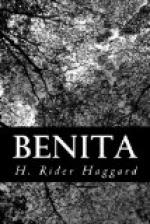So there was nothing for it but to go on working with the crowbar. At length, towards the evening of the third day of their labour, when the two men were utterly tired out, a hole was broken through, demonstrating the fact that beneath this cover lay a hollow of some sort. Mr. Clifford, to say nothing of Benita, who was heartily weary of the business, wished to postpone proceedings till the morrow, but Jacob Meyer would not. So they toiled on until about eleven o’clock at night, when at length the aperture was of sufficient size to admit a man. Now, as in the case of the well, they let down a stone tied to a string, to find that the place beneath was not more than eight feet deep. Then, to ascertain the condition of the air, a candle was lowered, which at first went out, but presently burnt well enough. This point settled, they brought their ladder, whereby Jacob descended with a lantern.
In another minute they heard the sound of guttural German oaths rising through the hole. Mr. Clifford asked what was the matter, and received the reply that the place was a tomb, with nothing in it but an accursed dead monk, information at which Benita could not help bursting into laughter.
The end of it was that both she and her father went down also, and there, sure enough, lay the remains of the old missionary in his cowl, with an ivory crucifix about his neck, and on his breast a scroll stating that he, Marco, born at Lisbon in 1438, had died at Bambatse in the year 1503, having laboured in the Empire of Monomotapa for seventeen years, and suffered great hardships and brought many souls to Christ. The scroll added that it was he, who before he entered into religion was a sculptor by trade, that had fashioned the figure on the cross in this chapel out of that of the heathen goddess which had stood in the same place from unknown antiquity. It ended with a request, addressed to all good Christians in Latin, that they who soon must be as he was would pray for his soul and not disturb his bones, which rested here in the hope of a blessed resurrection.
When this pious wish was translated to Jacob Meyer by Mr. Clifford, who still retained some recollection of the classics which he had painfully acquired at Eton and Oxford, the Jew could scarcely contain his wrath. Indeed, looking at his bleeding hands, instead of praying for the soul of that excellent missionary, to reach whose remains he had laboured with such arduous, incessant toil, he cursed it wherever it might be, and unceremoniously swept the bones, which the document asked him not to disturb, into a corner of the tomb, in order to ascertain whether there was not, perhaps, some stair beneath them.
“Really, Mr. Meyer,” said Benita, who, in spite of the solemnity of the surroundings, could not control her sense of humour, “if you are not careful the ghosts of all these people will haunt you.”
“Let them haunt me if they can,” he answered furiously. “I don’t believe in ghosts, and defy them all.”




